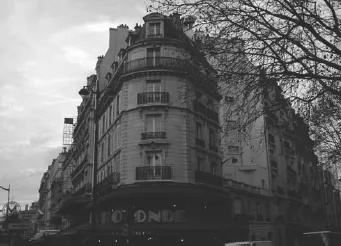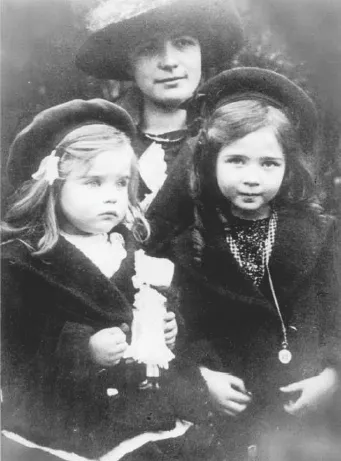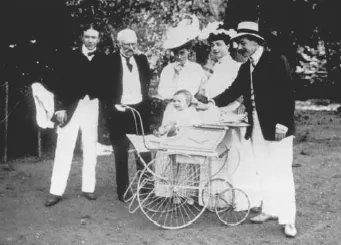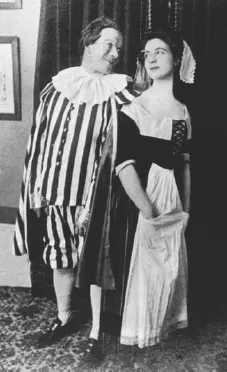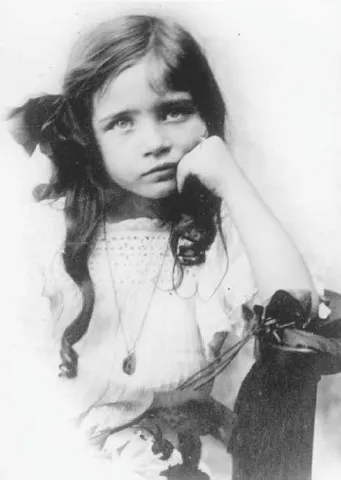![]()
1
The Birth of an Intellectual
Simone de Beauvoir was born and died in Montparnasse, a district on the Left Bank in Paris. Despite her considerable travels, intellectual, geographical and personal, she never really left Montparnasse. She was born on 9 January 1908 at 103 Boulevard du Montparnasse, in an apartment overlooking the Boulevard Raspail, above the Café de la Rotonde on the carrefour Vavin. Opposite stands the Dôme, another of Beauvoir’s favourite cafés, where she would finish writing her first novel, L’Invitée, during the Nazi occupation of Paris during the Second World War. The road south from the carrefour Vavin down the Boulevard Raspail leads to the Montparnasse cemetery where Beauvoir is buried with Jean-Paul Sartre. A few minutes’ walk from their grave, a petrified angel personifying ‘Souvenir’ or ‘Remembrance’ places a posy at an invisible grave, emblematizing a powerful tendency that would drive the intellectual preoccupations of the child born to Françoise Brasseur and Georges de Beauvoir in 1908: bearing witness to her century.
Witnessing her experience with clarity was at the heart of Simone de Beauvoir’s passionate engagement with the world. In early childhood photographs with her parents and younger sister, Hélène, the quality of the young Simone’s bright blue-eyed gaze is striking. Often looking straight at the camera, the defiant acuity of her focus and the power of her presence are remarkable. Contrasting with her mother’s passive, almost extinguished gaze, it is evident that Simone’s vitality, brilliance and determination were destined to propel her beyond the constraints of the patriarchal bourgeois milieu into which she was born.
The Café de la Rotonde, Paris.
Her father, Georges, was present throughout his wife’s labour and his preference for the currently chic name of ‘Simone’ was responsible for breaking with the erstwhile family tradition of naming the new baby girl after her grandmother. Hence she was baptized six weeks later into the Catholic faith as Simone-Ernestine-Lucie-Marie Bertrand de Beauvoir. She was born to passionate and strongly individual parents, who both found themselves in conflict with the expectations of their bourgeois background, albeit for different reasons.
Georges de Beauvoir was the highly intelligent but rather sickly third child of Ernest-Narcisse and Léontine Bertrand de Beauvoir, from a land-owning branch of the family in the Limousin. Echoing aspects of Sartre’s childhood, Simone’s father Georges grew up cossetted by his mother and bullied by his elder brother and took refuge in reading adventure stories. In addition to his scholarly interests, pursued within an affluent but not aristocratic family setting, he developed a love of theatre and performance. More accessible than literature and providing swifter self-gratification, the world of amateur dramatics provided Georges with a means of ready self-reinvention when the real world proved resistant to his expectations. He identified strongly with his father’s apparently easy lifestyle, which was acquired by marrying into wealth, although his aristocratic aspirations were initially kept in check by his mother’s values of austerity, religious observance and hard work. When his mother died when he was thirteen, Georges’ father left him largely to his own devices. Thereafter, grief over his mother’s death and an entrenched scepticism towards Catholicism hardened into vocal atheism, and Georges’ love of performance drew him to the legal profession as a means of supplementing his somewhat meagre inheritance. Charming and charismatic, Georges became a theatre-going dandy by night and an underachieving lawyer by day. As these personas co-existed in increasing tension within him, they were held together by virulent nationalism and anti-Semitism, fuelled by the Dreyfus case and its aftermath, which had recently ignited France.
Souvenir statue in Montparnasse cemetery, Paris. | |
Simone de Beauvoir (on right) with her younger sister and mother in 1915.
Simone de Beauvoir surrounded by her family in 1908.
As Beauvoir observes in her memoirs, her father was as convinced of the guilt of Alfred Dreyfus as her mother was convinced of the existence of God. The Dreyfus case, which centred on the false indictment of a Jewish army officer in 1894 for spying for the Germans, became the Dreyfus Affair in 1897 when it became apparent that a serious miscarriage of justice had occurred. The Affair divided France into two virulently opposed camps, who initially supported or condemned Dreyfus. Thereafter, the split had a catalysing effect that broadly mobilized Catholics, monarchists, the army and anti-Semites (among whom Georges de Beauvoir numbered) against anticlericals and antimilitarists, exacerbating tensions between the French state and the Catholic Church. Dreyfus was finally exonerated from his sentence of life imprisonment in 1906. However, the case and its subsequent Affair saw the emergence of the modern French public intellectual, exemplified by the Dreyfusard writer Émile Zola, which paved the way for subsequent twentieth-century intellectual activists such as Sartre and Beauvoir. Her father saw the Dreyfus case and its results as another example of how France and civilization more generally were succumbing to the pernicious influence of intellectuals with their foolish ideas of human rights, pacifism, inter-nationalism and socialism; these, ironically, would be among the values which Beauvoir would later seek to defend in her adult life.1 Her father, therefore, represented a powerful ideological force of extreme right-wing individualism against which she sought to define herself.
| Georges de Beauvoir and Françoise de Beauvoir as amateur actors. |
Beauvoir’s mother, Françoise, was born in Verdun in northeastern France in a strictly observant religious household presided over by her father, Gustave Brasseur, a banker who had been educated by Jesuits, and her mother, Lucie, who had been sent by her mother to live in a convent from a young age. Françoise was the eldest of three children and a severe disappointment to her parents on the grounds that she was not a boy. Françoise sought compensation for her sense of abandonment by immersing herself in Catholicism at her convent school. She grew intensely jealous of her younger sister, Lili, who attracted the adoration that she craved. Emotionally neglected, Françoise fell in love with her cousin, Charles Champigneulles, in her late teens but her marriage prospects fell through when it became apparent that her father Gustave’s business interests were increasingly dubious. When Françoise was introduced to Georges de Beauvoir by family friends, he seemed to answer her prayers for a good marriage to a handsome, charming and socially respectable suitor.
As Simone de Beauvoir later observed in Une mort très douce, a moving testimony to her mother’s life, illness and death, the example of her mother’s experience of married life convinced her that the institution of bourgeois marriage was unnatural. Although Georges and Françoise initially enjoyed a happy union, it could not be a partnership of equals. Georges de Beauvoir was used to pleasing himself and regarded his younger wife as his vassal to be instructed. She, in turn, regarded him as the sole authority, as she sought to incarnate the ideal of Catholic wife and mother whose preserve was the home and the religious upbringing of her daughters.
In 1908, when Simone de Beauvoir was born, Frenchwomen were legal minors, with very few rights, even over their own children or income. One of the attractions of Françoise Brasseur for her husband-to-be was that she came from a family of considerable wealth. However, in 1909, two years after their wedding and a year after Simone’s birth, Gustave Brasseur’s bank went into liquidation and the following year he was imprisoned for fraudulent misuse of bank funds. Not only was Françoise’s dowry never paid but a cloud of disgrace thenceforth hung over her family, thereby exacerbating her deep sense of personal inadequacy in her marriage.
Simone was an imperious and energetic child who was intoxicated by her experience of life. Swiftly frustrated by the endless interdictions which confronted her as a young girl, she had a lively temper which appears to have intimidated her mother. In 1910 her childish pre-eminence in the family was suddenly no longer assured because her mother gave birth to another baby girl, Hélène, who was to become Simone’s adoring witness to her life, an ‘other’ against whom she began to define herself. In their early childhood, as was usual within the French haute bourgeoisie, Simone and Hélène were routinely cared for by the maid, Louise. Françoise de Beauvoir played the role of the beautiful young wife, an adored yet rather emotionally distant mother.
In her memoirs Beauvoir describes her earliest childhood encounters with the world as an alimentary drama in which she played the leading role, intoxicated by colourful confectionery but revolted by having to ingest the glutinous mysteries of porridge, milk puddings and shellfish:
The world became more intimately part of me when it entered through my mouth than through my eyes and sense of touch. I would not accept it entirely. The insipidity of milk puddings, porridge, and bread soups made me burst into tears; the oiliness of fat meat and the clammy mysteries of shellfish revolted me . . . On the other hand, I eagerly took advantage of that privilege of childhood which allows beauty, luxury, and happiness to be things that can be eaten: in the rue Vavin I would stand transfixed before the windows of confectioners’ shops, fascinated by the luminous sparkle of candied fruits, the cloudy lustre of jellies, the kaleidoscopic inflorescence of acidulated fruit-drops – green, red, orange, violet.2
Evidence of the young Simone’s passion for life, this passage also suggests her anxiety concerning self–other boundaries exemplified by maternal dependence and engulfment, indeed her anxiety about anything which might act as an obstacle to her existential transcendence. Her rages against her condition of ‘dutiful daughter’ became legendary and her mother, who identified with Simone’s parallel position as eldest daughter, vented her maternal frustrations on Hélène instead.
Georges set about educating his eldest daughter in traditional French culture. Simone was as charmed by his domestic absence as by his presence. He was, in effect, her first intellectual mentor and she admired his intellect, culture and supposed common sense. An opening image in Beauvoir’s memoirs depicts her enclosed by the womb-like space of her father’s desk as she learns about the world and is an apt rendition of her early situation as a budding female intellectual within the patriarchal intellectual world into which she was born:
I retain only one confused impression from my earliest years: it is red, and black, and warm. Our apartment was all red: the carpet, the Henri II dining-room, the embossed silk hangings over the stained-glass doors as well as the velvet curtains in Papa’s study. The furniture in this sanctum was made of black-stained pear-wood; I used to creep into the knee-hole under the desk and envelop myself in its gloom; it was dark and warm, and the red of the carpet glared in my eyes. That is how I seem to have passed the early days of infancy. Safely ensconced, I watched, I touched, I took stock of the world.3
Her father’s intellectualism contrasted sharply with her mother’s narrow world of religiosity, governed by Good and Evil and seemingly irrational interdictions. Françoise de Beauvoir aimed to inculcate her eldest daughter with her values of modesty, duty and social conformity, allied with strict religious observance. Both Simone and Hélène attended a private Catholic school, the Cours Désir, distinguished by its Christian virtues rather than by the quality of its educational provision. Simone was especially devout, going on retreat once a year, taking Holy Communion three times a week and praying between classes. Religion was a ritualized practice but it was also a theatrical performance. Simone and Hélène amused themselves by inventing scenes of religious martyrdom or of damsels in distress which they enacted from their childhood reading. They invented a safe childhood world removed from the surveillance of their mother. Whenever their parents went out, from the balcony of their apartment they would watch the comings and goings from Le Dôme or La Rotonde, speculating upon whom the interesting artistic types might be who frequented these Left Bank cafés.
Simone de Beauvoir in 1913, aged five.
Countering the intense religious devotion of his wife, Georges de Beauvoir was vociferous in his atheism. Simone and Hélène were bemused by his absence from church. He would read aloud nationalistic tracts to his wife and daughters as well as excerpts from French literary classics, dictating, for example, passages from Victor Hugo for Simone to transcribe. When the First World War broke out, he was not immediately called up due to a heart condition. However, when the call did come he joined the Zouave regiment, which was especially known for its flamboyant Algerian uniform that seemed ideally suited, at least sartorially, to Georges’ theatrical predilections. In 1916 he suffered a heart attack and was then sent to work at the war ministry in Paris, thereby escaping the Zouaves’ annihilation at Verdun.
According to his youngest daughter, Georges de Beauvoir was broken by his wartime experience. Used to pleasing himself and living the life of a Parisian dandy, the shock of even the few weeks he spent at the front must have been intense to a man who preferred to live in a world of fantasy and privilege. After the war, he did not re-open his legal practice and sought to survive by varied means of self-employment that proved precarious. Meanwhile, the marriage between Georges and Françoise deteriorated as their financial resources dwindled and Georges pursued a bachelor life outside the home.
Beauvoir would later claim in her autobiography that her familial situation echoed that of her father’s because she found herself suspended between her mother’s strict Catholicism and her father’s atheistic individualism. She contends that this ideological clash between her parents largely explains why she became an intellectual, as she tried to make sense of the familial conflicts that she witnessed. This is one of many autobiographical verdicts advanced by Beauvoir that are glossed by a prevailing sense of her own good fortune. As she would later observe in relation to her mother’s life, ‘nothing ever eradicates childhood’, and at least until her early teenage years, Beauvoir’s childhood was a largely happy one. If one were to seek to identify her ‘original project’, as Sartre would later term the ways in which the disparate circumstances of a life are unified by an individual’s self-orientating response to those circumstances, one could identify it as Beauvoir’s choice to become a writer, accompanied by a tenaciously constructive approach to her experience. These traits were identified by her friend René Maheu who coined her nickname, ‘le castor’ or ‘beaver’, taken from Jean Cocteau’s Le Potomak, in which beavers are characterized as ‘noble architects’. This is substantiated by the energetic way in which Beauvoir pursued freedom and sought to craft her life both on and off the page as a project through which she launched herself into the possibilities of the future.
Exacerbated by her later immersion in existential phenomenology, the conditions for this original choice are first found in the ways in which Beauvoir engaged with the ‘facticity’ or given features of her childhood as a French, bourgeois, Catholic girl who was born in 1908 to a particular couple. From both parents, Simone acquired a passion for life. More particularly, from her father she acquired a strong sense of individualism and self-belief; from her mother she would retain a powerful intuition of responsibility towards the other, the lifelong remnant of her childhood Catholic faith. Simone’s life became driven by a perpetual questioning of her experience and a desire for clarity and reason in response to the religious dogma and bourgeois unreason with which she...




